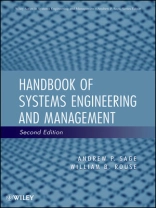The trusted handbook–now in a new edition
This newly revised handbook presents a multifaceted view of
systems engineering from process and systems management
perspectives. It begins with a comprehensive introduction to the
subject and provides a brief overview of the thirty-four chapters
that follow. This introductory chapter is intended to serve as a
‘field guide’ that indicates why, when, and how to use the material
that follows in the handbook.
Topical coverage includes: systems engineering life cycles and
management; risk management; discovering system requirements;
configuration management; cost management; total quality
management; reliability, maintainability, and availability;
concurrent engineering; standards in systems engineering; system
architectures; systems design; systems integration; systematic
measurements; human supervisory control; managing organizational
and individual decision-making; systems reengineering; project
planning; human systems integration; information technology and
knowledge management; and more.
The handbook is written and edited for systems engineers in
industry and government, and to serve as a university reference
handbook in systems engineering and management courses. By focusing
on systems engineering processes and systems management, the
editors have produced a long-lasting handbook that will make a
difference in the design of systems of all types that are large in
scale and/or scope.
लेखक के बारे में
Andrew P. Sage, Ph D, became the First American Bank
Professor of Information Technology and Engineering at George Mason
University and the first Dean of the School of Information
Technology and Engineering. Dr. Sage is a member of the National
Academy of Engineering, as well as a Fellow of the IEEE, the
American Association for the Advancement of Science, and INCOSE. He
is the Editor of the Wiley Series in Systems Engineering and
Management and of Wiley’s Journal of Systems
Engineering.
William B. Rouse, Ph D, is a professor in the School of
Industrial and Systems Engineering at the Georgia Institute of
Technology and holds a joint appointment within the College of
Computing. He also serves as Executive Director of the Tennenbaum
Institute, a campus-wide research center focused on complex
organizational systems. Dr. Rouse is a member of the National
Academy of Engineering, as well as a Fellow of the IEEE, the
International Council on Systems Engineering, the Institute for
Operations Research and the Management Sciences, and the Human
Factors and Ergonomics Society.












